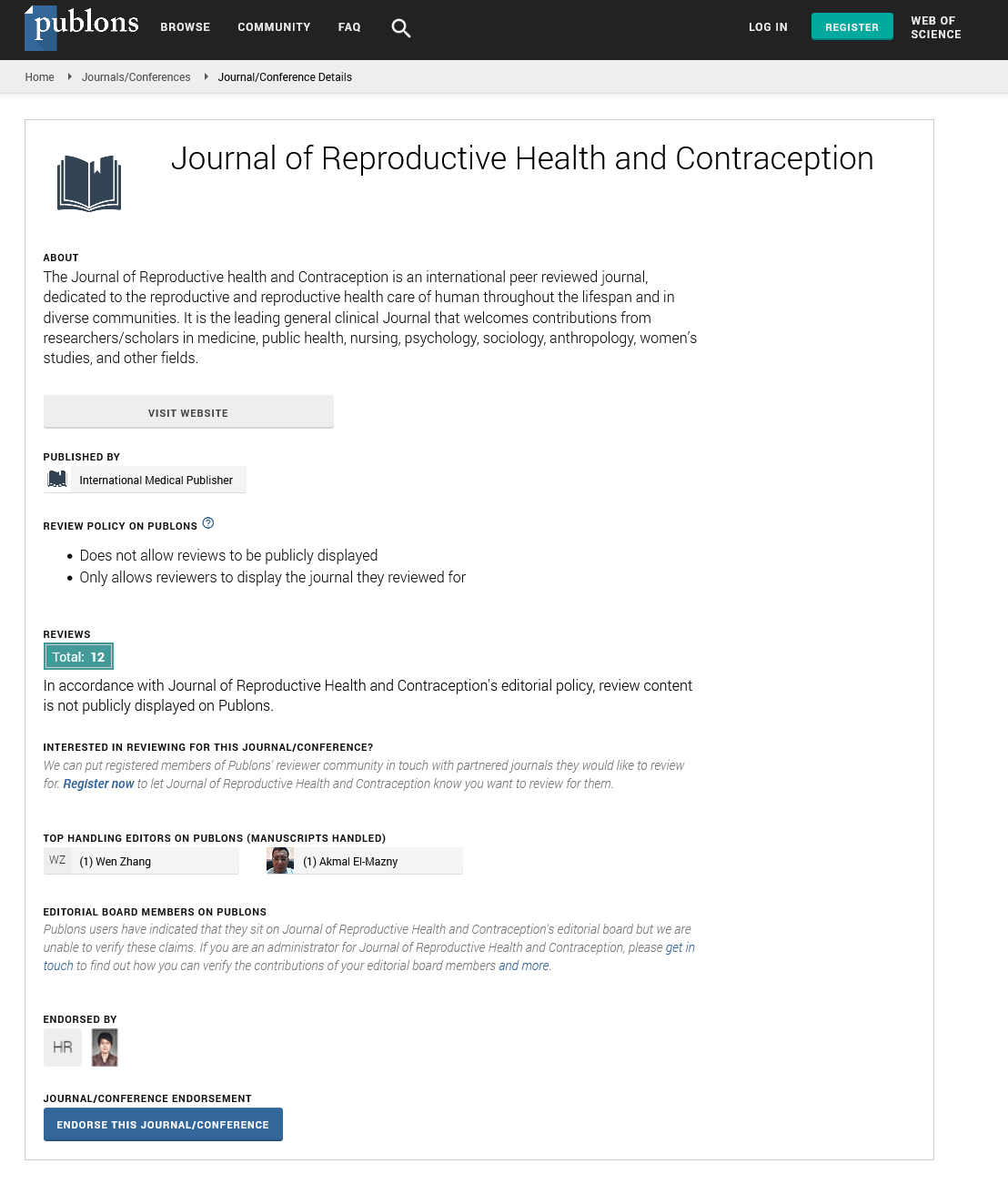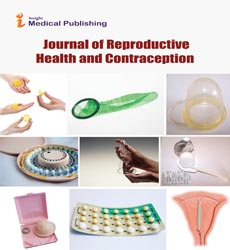The Journal of Reproductive health and Contraception is an international peer reviewed journal, which provides a highly-accessed platform for all research related to reproduction and reproductive health care of human throughout the lifespan and in diverse communities. It deals with Reproductive health, Endometriosis, Gynaecologic problems, STD diseases, Polycystic Ovary Syndrome (PCOS), Sexually Transmitted Diseases (STDs), Sexual Violence, Resources, Maternal health, Contraception, Sexually transmitted infection, Female genital mutilation, Child and forced marriage, ICPD and abortion, child mortality, Maternal mortality, Family planning, etc., The journal includes a wide range of fields in its discipline to create a platform for the authors to make their contribution towards the journal and the editorial office promises peer reviewing for the submitted manuscripts to ensure quality.
Aims and Scope
The journal aims to serve its readers as an authoritative resource that provides forum for sexual and reproductive healthcare related scientific information. It publishes high quality research and information relevant to clinical care, training and education in the field of contraception and reproductive/sexual health. The range of appropriate topics is broad which cover all aspects of sexual and reproductive healthcare. Pregnancy, Labour and birth, Endometriosis, Uterine Fibroids, HIV/AIDS, Interstitial Cystitis, , Sexually Transmitted Diseases (STDs), Post-natal period and early parenthood, Breastfeeding, Menstruation and Menopause, Fertility/Infertility, Reproductive cancers, adolescent health, Midwifery, Maternal health, Gynaecological and Obstetrical topics related to reproductive health, Reproductive Cancers, Urologic and Gynaecologic Disorders, Reproductive Health and the Environment, Reproductive medicine. Social and gender issues, Sex education, Sexual health, Female genital mutilation, Gender-based violence, Sexuality and sexual rights.
Authors are welcome to submit articles in the form of a research article, review article, short communications, brief reports and case studies, letter to editor and commentary, image articles, video articles, opinion, letter editors, conference proceedings, reports, case reports etc .,
Submit your articles online https://www.imedpub.com/submissions/contraceptive-studies.html
Contraceptives
Birth control, also known as contraception and fertility control, are methods or devices used to prevent pregnancy.
Related Journals for Contraceptives
Critical Care Obstetrics & Gynecology, Contraception,European Journal of Contraception and Reproductive Health Care, Advances in Contraception, Journal of Reproduction and Contraception
Barrier Contraceptives
Barrier methods of contraception work by creating a physical barrier between sperm and egg cells so that fertilization cannot occur. Some methods also protect against sexually transmitted disease (STDs).
Related Journals for Barrier Contraceptives
Current Trends in Gynecologic Oncology, Contraception Report, Dialogues in contraception, AVSC news (Association for Voluntary Surgical Contraception.
Behavioral Contraceptives
Continuous abstinence which is one of the most behavioural method of contraception is completely refraining from sexual intercourse. There are no hormonal side effects, and abstinence is endorsed by many religious groups.
Related Journals for Behavioral Contraceptives
Sexually Transmitted Diseases, Contraception, Contraception Report, Dialogues in contraception, Advances in Contraception.
Birth Control
Birth control is a way for men and women to prevent pregnancy. There are many different methods of birth control, including hormonal contraception such as "the pill."
Related Journals for Birth Control
Critical Care Obstetrics & Gynecology, American Journal of Obstetrics and Gynecology, European Journal of Obstetrics & Gynecology and Reproductive Biology, International Journal of Gynecology & Obstetrics, Fertility and Sterility.
Contraception
Contraception (birth control) prevents pregnancy by interfering with the normal process of ovulation, fertilization, and implantation. There are different kinds of birth control that act at different points in the process.
Related Journals for Contraception
Reproductive System & Sexual Disorders, Journal of Pediatric and Adolescent Gynecology, Contraception, Gynecologie Obstétrique & Fertilite, Journal of Pediatric and Adolescent Gynecology, European Journal of Obstetrics & Gynecology and Reproductive Biology,
Dual Protection Contraceptives
A Dual Protection or ‘Double Dutch’ approach to contraception gives the best protection against pregnancy and sexually transmitted infections (STIs) for sexually active people. Most commonly, people practise Dual Protection by using condoms and the pill at the same time.
Related Journals for Dual Protection Contraceptives
Sexually Transmitted Diseases: Open Access , Appetite, Contraception, Middle East Fertility Society Journal, Annals of Epidemiology, Journal of Adolescent Health.
Emergency Contraceptives
Emergency contraception is a safe and effective way to prevent pregnancy after unprotected intercourse. It prevents the sperm from fertilising an egg by changing the way the sperm moves in women’s body.
Related Journals for Emergency Contraceptives
Critical Care Obstetrics & Gynecology, Reproductive Health Matters, The Journal for Nurse Practitioners, Drugs During Pregnancy and Lactation, Annals of Epidemiology, Contraception.
Family Planning
Family planning allows individuals and couples to anticipate and attain their desired number of children and the spacing and timing of their births. It is achieved through use of contraceptive methods and the treatment of involuntary infertility. A woman’s ability to space and limit her pregnancies has a direct impact on her health and well-being as well as on the outcome of each pregnancy.
Related Journals for Family Planning
Sexually Transmitted Diseases: Open Access, Journal of Adolescence, Journal of Family Planning and Reproductive Health Care, Population reports. Series J: Family planning programs, Family planning manager.
Fertility Control
“Fertility control,” as the term is used, refers to patterns of human behavior that have as their primary objective the prevention of unwanted pregnancies and births. Individuals and couples adopt these patterns in accordance with their cultural values, reinforced by formal or informal social pressures.
Related Journals for Fertility Control
Gynecology & Obstetrics,Theriogenology, Fertility and Sterility, Reproductive Bio Medicine Online, International Journal of Gynecology & Obstetrics, The Journal of Urology.
Hormonal Contraceptives
Hormonal contraception works very well at preventing pregnancy. Hormonal contraceptives reduce endometrial growth, so it is theoretically possible that they may also block conception by interfering with implantation.
Related Journals for Hormonal Contraceptives
Sexually Transmitted Diseases: Open Access,Contraception, American Journal of Obstetrics and Gynecology, Maturitas, International Journal of Gynecology & Obstetrics.
Implantable Contraceptives
A contraceptive implant is a type of birth control. Implantable contraception is a small, flexible plastic tube containing hormones that doctors insert just under the skin of the upper arm. The hormones delivered in this way can help protect against pregnancy for up to 3 years.
Related Journals for Implantable Contraceptives
Critical Care Obstetrics & Gynecology, Contraception, Journal of Pediatric and Adolescent Gynecology, Obstetrics & Gynecology, American Journal of Obstetrics and Gynecology.
Intrauterine Devices
Contraception tries to stop this by keeping the egg and sperm apart or by stopping eggs being produced. One method of contraception is the intrauterine device, or IUD (sometimes called a coil).
Related Journals for Intrauterine Devices
Gynecology & Obstetrics, Contraception, Medical Clinics of North America, American Journal of Obstetrics and Gynecology, Journal of Adolescent Health.
Sex Education
Sex education ('sex ed'), which is sometimes called sexuality education or sex and relationships education, is the process of acquiring information and forming attitudes and beliefs about sex, sexual identity, relationships and intimacy.
Related Journals for Sex Education
Sexually Transmitted Diseases: Open Access, Sex Education, Journal of Pediatric and Adolescent Gynecology, Journal of Adolescent Health, Asian Nursing Research, Reproductive Health Matters.
Sexually Transmitted Infections
Sexually transmitted infections (STI) are infections that are commonly spread by s
Related Journals for Sexually Transmitted Infections
Sexually Transmitted Diseases: Open Access, Sexually Transmitted Infections, Life Sciences, International Journal of Gynecology & Obstetrics, Cancer Epidemiology, Journal of Pediatric and Adolescent Gynecology.
Sterilization
The act or process by which an individual is rendered incapable of fertilization or reproduction, as by vasectomy, partial salpingectomy or castration.
Related Journals for Sterilization
Reproductive System & Sexual Disorders, European Journal of Obstetrics & Gynecology , Fertility and Sterility, International Journal of Gynecology & ObstetricS.
Tubal Ligation
Tubal ligation is surgery to close a woman's Fallopian tubes. It is sometimes called "tying the tubes.") The Fallopian tubes connect the ovaries to the uterus. A woman who has this surgery can no longer get pregnant. This means she is "sterile."
Related Journals for Tubal Ligation
Andrology & Gynecology: Current Research, Journal of Minimally Invasive Gynecology, Fertility and Sterility, International Journal of Gynecology & Obstetrics, Contraception, Gynecologic Oncology.
Vasectomy
A vasectomy is considered a permanent method of birth control. Vasectomy is minor surgery to block sperm from reaching the semen Semen still exists, but it has no sperm in it. After a vasectomy the testes still make sperm, but they are soaked up by the body.
Related Journals for Vasectomy
Reproductive System & Sexual Disorders, Urological Science, Contraception, Urology, Journal of Reproductive Immunology, Fertility and Sterility, The Journal of Urology.
Reproductive Physiology
Effective public health programs, research, and policy relating to human sexuality, pregnancy, contraception, and the transmission of sexually transmitted infections (including HIV) depends upon knowledge of the structure (anatomy) and function (physiology) of the male and female reproductive systems.
Related Journals for Reproductive Physiology
Sexually Transmitted Diseases: Open Access, Reference Module in Biomedical Science, General and Comparative Endocrinology, Comprehensive Toxicology, Fertility and Sterility.
Prenatal Diagnosis
Prenatal diagnosis employs a variety of techniques to determine the health and condition of an unborn fetus. Without knowledge gained by prenatal diagnosis, there could be an untoward outcome for the fetus or the mother or both.
Related Journals for Prenatal Diagnosis
Gynecology & Obstetrics, Prenatal Diagnosis, Journal of Prenatal Diagnosis and Therapy, Journal of Prenatal Diagnosis and Therapy,Polish Annals of Medicine.








